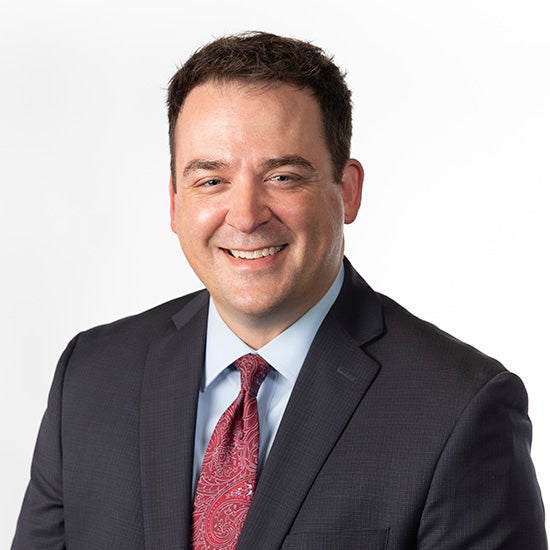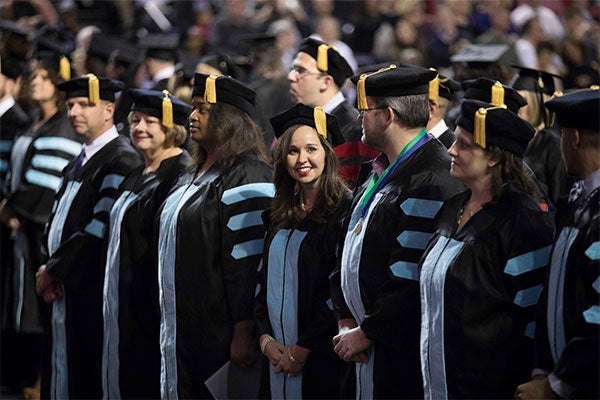Program Overview
Lipscomb University’s Ph.D. in Leadership with concentrations in either strategic innovation or policy, is an interdisciplinary studies degree that aims to prepare students for high-level careers in leadership and service across a range of professional sectors. The goal is to equip professionals to pursue challenging, high-level responsibilities requiring advanced knowledge, training, and rigor, and to do so with the highest levels of integrity, ethical understanding, and behavior.
Program Outcomes
The program aspires to produce graduates who have developed exceptional skills to lead effectively, understand policy development and implementation processes, organize substantial amounts of information, research subjects broadly, independently manage and bring to successful fruition complex and in-depth projects, adapt to changing environments, and who are subsequently prepared to be a valued resource to the professional community.
Admissions Requirements
We are eager to get you started on your journey toward a Ph.D. in Leadership. The current admission requirements are:
- Completed online application
- $50 application fee
- Official transcripts
- Three letters of recommendation (including a professional recommendation)
- A personal statement on your journey of faith and spiritual development
- Purpose Statement for pursuing Ph.D. in Leadership and Policy Studies
- Current resume
- Writing assessment
- Interview with doctoral faculty committee
Transfer Credit
A maximum of 15 hours of post-masters coursework may be transferred toward direct-equivalent courses in the Ph.D. program. Additionally, the following guidelines for Ed.S. coursework apply:
- Approved leadership courses that are 600 level or higher within an Ed.S. in Educational Leadership Program may be transferred toward the Leadership Concentration (up to 15 hours).
- Only six post-masters hours may be transferred toward direct-equivalent courses in the research sequence and only if earned within the 5 years prior to enrollment in the Ph.D. program.
Courses
Fall 2025
Full-term: EG 8473 Global Perspectives in Leadership
Term I: EG 7403 Doctoral Seminar I
Term II: EG 8403 Doctoral Seminar II
Spring 2026
Full-term: EG 7213 Qualitative Research
Strategic Innovation Concentration
- Term I: EG 7323 Governance, Decision-Making and Communication
- Term II: EG 7263 Strategy, Entrepreneurship and Innovation
Policy Concentration
- Term I: EG 7323 Governance, Decision-Making and Communication
- Term II: EG 8453 Global Perspectives in Policy
Summer 2026
Full-term: EG 7133 Organizational Theory and Practice
Strategic Innovation Concentration
Term I: EG 7233 Strategic Planning & Res. Allocation
Term II: EG 7203 Change and Conflict
Policy Concentration
Term I: MPA 6113 Intersection Fed System & State Leadership
Term II: EG 7203 Change and Conflict
Fall 2026
Full-term: EG 7433 Statistics for Social and Beh. Science
Strategic Innovation Concentration
Term I: EG 8233 Strategic Advocacy and Proposal Writing
Term II: EG 7273 Organizational Turnaround and Renewal
Policy Concentration
Term I: EG 8233 Strategic Advocacy and Proposal Writing
Term II: EG 7383 Finance and Policy
Spring 2027
Full-term: EG 8213 Advanced Quantitative Research
Term I: EG 8323 Special Topics in Leadership & Policy
Strategic Innovation Concentration
- Term II: EG 6533 Cross-Functional Teaming
Policy Concentration
- Term II: EG 8313 Policy Analysis and Change
Summer 2027
Full-term: EG 7173 Applied Research Seminar
Term II: EG 8323 Special Topics in Leadership & Policy
Strategic Innovation Concentration
Term I: EG 7243 Contemporary Issues
Policy Concentration
Term II: EG 7343 Policy Seminar
Fall 2027
Full-term: EG 8013 Dissertation Research I
Spring 2028
Full-term: EG 8023 Dissertation Research II
Summer 2028
Full-term: EG 8033 Dissertation Research III
Tuition & Aid
Lipscomb University is committed to making our first-class education as affordable as possible. For students earning their Ph.D. in Leadership, the tuition is:
- $953* per credit hour
- $715 with 25% in-service discount
With various scholarship and financial aid programs available, your out-of-pocket cost of attendance can be much lower. Learn more about your financial aid options.
*Note: The graduate tuition rates may increase annually, effective each summer semester.
Why Earn Your Ph.D. Degree at Lipscomb University?
Years to complete
Our Faculty
Career Paths
University Faculty
Educators work in higher education as faculty or in administrative roles such as program directors, deans, vice presidents, and presidents. Their job duties vary depending upon the role they fill, but leadership and research expertise is key to success in these roles.
Nonprofit Director
Nonprofit Directors work as liaisons between the board and staff to discover and provide resources for growth, as well as pinpoint areas to incite change.
Policy Director
Policy Directors bear the responsibility of analyzing, implementing and directing policies for a variety of organizations in accordance with regulations and impact.
Public Service
Professionals in the Public Service field work to preserve the quality of life and environments through policies and regulations at various levels from local to federal government.
Organizational Leadership
Individuals in Organizational Leadership positions make decisions that impact an organization in its entirety, from the initial point of contact offices like HR to high level efficiencies.










